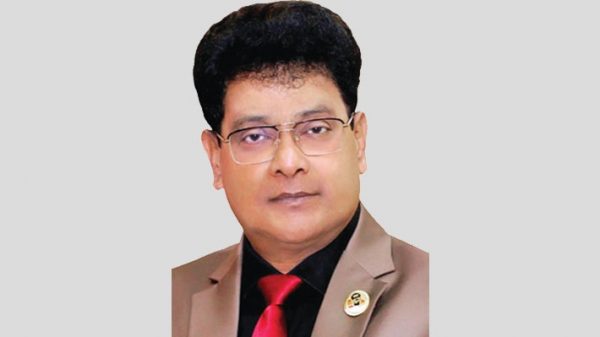Bangamata: A Perennial Source of Inspiration for Bangabandhu

M. Shahinoor Rahman PhD:
People from all corners always recognise Bangamata Sheikh Fazilatunnesa Mujib with the most profound respect for her immense contributions to the Nation. People universally acclaim that behind every successful man, there is a woman. This saying is essentially true in the life of the harbinger of the freedom of Bangladesh, Father of the Nation Bangabandhu Sheikh Mujibur Rahman. Concerning the long-drawn struggle for the country’s liberation, the efforts of building the Nation, and the weal and woe of Bangabandhu’s life, the graceful name, which deserves repeated pronouncement with the utmost respect, is Bangamata Begum Sheikh Fazilatunnesa Mujib, whom Bangabandhu called Renu. Whenever we talk about Bangabandhu and his achievements, her inescapable presence seems obvious as an ever-inspiring factor. Therefore, Bangamata Begum Mujib herself contributed most to Sheikh Mujibur Rahman’s development from Khoka to Mujib, from Mujib to Bangabandhu, and from Bangabandhu to the Father of the Nation.
Although the mainstream historiographers of Bangladesh have by far remained astonishingly silent about Bangamata, the Father of the Nation himself has affectionately and respectfully mentioned her name on numerous occasions in his ‘The Unfinished Memoirs’ and ‘Prison Diary’. From ‘The Unfinished Memoirs’, we understand that Bangamata was only three, and her elder sister was five when they lost their father. Their mother died just two years after her father’s death. Their grandfather Sheikh Md. Abul Kasem took the responsibility of bringing up these two orphan sisters. It was according to the intention of Bangamata’s grandfather that she was married to Bangabandhu. In ‘The Unfinished Memoirs’, Bangabandhu commemorates the event in the following manner: When I got married, I must have been around thirteen years old. After Renu’s father died, her grandfather called my father and said, ‘You will have to marry off your eldest son to one of my granddaughters. This is because I intend to bequeath all my property to my two granddaughters.’ Renu’s grandfather was my Father’s uncle, and I had to marry her because of my father’s command. (p. 6) Bangamata began to live with the family of Bangabandhu when her mother died, and she found a true mother in her mother-in-law Sayera Khatun. During her marriage, she was a mere child, and she practically grew up along with her husband and his siblings amid various childhood games and merriments. Bangamata began to engage herself in her family responsibilities only after Bangabandhu’s passing his entrance examination in 1942 and his admission to the Calcutta Islamia College. Bangabandhu already tied himself with politics by then, and it was apparent that Bangamata rendered her absolute services to his nation-building. She gradually became the core of courage and inspiration that gave Bangabandhu relentless hope to strive forward with the cause of the betterment of the people of Bengal. Bangamata was the woman who forsook every personal desire in favour of Bangabandhu’s political career. She never wanted to fulfil any personal wish; instead, she tried to save whatever money she could and would give her savings to her young husband to meet his political expenses. She continued doing the same throughout her life. To quote Bangabandhu, “Whenever I went home she would give me whatever she managed to raise so that I could meet my expenses. She would never say no to me and would not spend any money for herself.” (The Unfinished Memoirs, p. 26). She was so dedicated to the political mission of Bangabandhu that she did not hesitate even to sell her ornaments to bear the expenses of the party when Bangabandhu used to be captivated in prison. Bangabandhu had to remain in jail for almost 12 years in his political life. Bangamata bore the burdens of raising the family, educating children, looking after-party activities, caring for hundreds of party workers. She did all these without any complaints and with a motherly air about her. From the beginning of their marital life, Bangamata did not get Bangabandhu’s close presence for a long time at a stretch because of Bangabandhu’s busy political schedules of his imprisonments. Still, the undercurrent of their conjugal love was so strong that they became real soul mates to one another. They lived through the most challenging times, relying on their mutual trust and respect. It was Bangamata from whom Bangabandhu would draw immense inspiration and, sometimes, suggestions also. When Bangabandhu remained out of home, Bangamata read books of different kinds and would discuss the subject matters of those books later with him. These discussions sometimes turned into political ones, and thereby Bangamata shared her thoughts regarding the conditions of people and state and even the political tactics with Bangabandhu. When Ayub Khan Regime in 1969 wanted the imprisoned Bangabandhu to join a meeting in Lahore on parole, Bangamata forbade Bangabandhu from accepting that, and accordingly, Bangabandhu refused the proposal. Guided by Bangamata, Bangabandhu eventually had proven to be a maker of momentous and historical decisions because this decision made the mass upheaval of 1969, which got Bangabandhu free from prison and made him the unanimous leader of the people of Bangladesh.
Bangamata Begum Fazilatunnesa Mujib was the perfect companion for Bangabandhu to wade through the dangerous heaves and sways of his tumultuous life. She was perhaps the only reason behind Bangabandhu’s becoming an author also. Bangamata had that intellectual height to inspire Bangabandhu to write memoirs and keep diaries to avoid monotonies of prison life. She even sent notebooks to his prison cell regularly. Such a great attempt of Bangamata has been a great boon for the Nation because Bangabandhu has left his memoirs and diaries for our generation to glimpse the true history of the time through the struggle for the liberation of our land and people.
Bangamata was the woman who sacrificed the most beautiful moments of her life at the altar of people’s freedom. She was the great heart who conquered all of her sufferings to establish the rights of Bengalis. She never came under limelight, never cared for name and fame; instead, she remained the faithful companion, chief adviser, and unparalleled well-wisher of the Father of the Nation. On the occasion of her birth anniversary, I would like to pay homage to her memory: salute, Bangamata. Joy Bangla Joy Bangabandhu.
Author is a columnist, researcher,academic and former Pro-Vice-Chancellor at Islamic University, Kushtia





























Leave a Reply